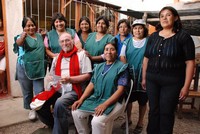Portraits of EoC Entrepreneurs - A spinning mill and the culture of the "calchaquies" in Argentina. This is how the ideal of fraternity, incarnated in the working world, can be the chance for redemption for a group of women who have always been discriminated against and, little by little, to rediscover their identity and their dignity. The advantage goes towards an entire aborigine community.
"Tinku Kamayu" Business (United to Work)
By Margarita Ramirez De Moreno, Santa Maria di Catamarca, Argentina
 I was born in Santa Maria, in a region at the foot of the Andes - rich in aboriginal culture but very poor. I'm a descendant of the aborigine "calchaquies", married and a mother of seven children.
I was born in Santa Maria, in a region at the foot of the Andes - rich in aboriginal culture but very poor. I'm a descendant of the aborigine "calchaquies", married and a mother of seven children.
I was the first diplomat to come from the Scuola Aurora of Santa Maria di Catamarca, recognized by the Argentinean government after 35 years of activity for its great educational contribution, as it also offers the study and recuperation of the techniques and symbols of the "quechua" culture. It was in that school that I met the Ideal of Fraternity, which I have chosen as the guiding compass of my life.
In 2003, faced with rampant unemployment, I started a spinning mill to supply the sewing lab at the school. It wasn't easy to convince the women of my land, who had always been discriminated, to take up the work of spinning again. To get to the mill, they would have to cross rivers and walk kilometers each day.
There were no means. Little my little, each one gave what they had: a spindle, wool, their own ability in some traditional art. There was still the problem of the expensive machinery.
One day, I was forced to ask for a ride, and I shared my worry with the driver. Right away, he said that he knew how to build spinning machines. "Can you do that for us?", I asked. And he said, "Yes, you can pay me when you can."It was at the same time when we had lost the place where we work, and the expert among us had been let go. They were difficult moments, and we even thought that maybe we should give up.
I proposed to my colleagues that we make a "pact": that of working each day, trying to find the good for the other, focusing our attention on the needs of the other, putting whoever is next to us in the first place. Actually, I was asking us all to live that Evangelical love that, I had learned, the Gospel itself asks. The rest "will be given to us in abundance."
Soon afterwards, we received a donation that we used to buy a building and some equipment. That is how the "Tinku Kamayu" boutique began. "Tinku Kamayu" means "united to work." At the beginning, we were eight. Now, we're eighteen employees, with increasing production. We feel part of a bigger project that even involves other "calchaquies" people. We have rediscovered our identity as a people, and with this hope, cultural growth, and the opportunity to for us and others to work, valuing the wealth of our people for the good of our cities.







